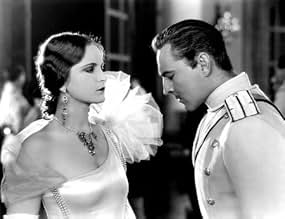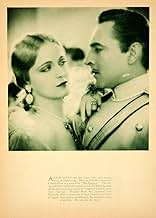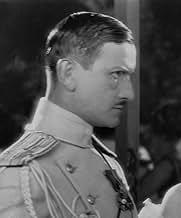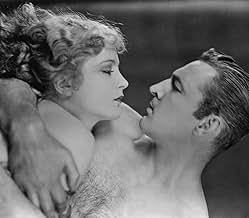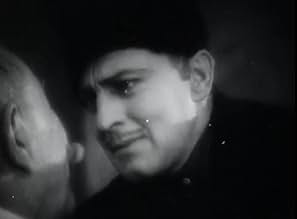VALUTAZIONE IMDb
6,7/10
581
LA TUA VALUTAZIONE
Aggiungi una trama nella tua linguaIn Czarist Russia, a peasant officer, resented by the aristocrats, falls in love with a princess.In Czarist Russia, a peasant officer, resented by the aristocrats, falls in love with a princess.In Czarist Russia, a peasant officer, resented by the aristocrats, falls in love with a princess.
- Regia
- Sceneggiatura
- Star
- Vincitore di 1 Oscar
- 4 vittorie totali
John Bleifer
- Soldier
- (non citato nei titoli originali)
Albert Conti
- Commission Board Member
- (non citato nei titoli originali)
Gregory Gaye
- Officer
- (non citato nei titoli originali)
Lena Malena
- Tamara's Friend
- (non citato nei titoli originali)
Michael Mark
- Soldier
- (non citato nei titoli originali)
Dick Sutherland
- Revolutionary Board Member
- (non citato nei titoli originali)
Wilhelm von Brincken
- Commission Board Member
- (non citato nei titoli originali)
Recensioni in evidenza
Enjoyable historical drama in which The Great Profile plays a Russian peasant who rises to the rank of Lieutenant immediately before the revolution only to find himself shunned by his fellow officers and the haughty princess he falls for. Fine chemistry between Barrymore and the beautiful German actress Camilla Horn helps paper over most of the film's meagre flaws.
TEMPEST (United Artists, 1928), presented by Joseph M. Schenck, directed by Sam Taylor, with uncredited work by Lewis Milestone, bears no relation to the William Shakespeare play, but is actually a military love story set against the background of the Russian Revolution in 1914. It stars the legendary "great profile" John Barrymore as Ivan Markov, a peasant soldier who becomes an officer in the Russian Army, after being told by his comrades that no peasant has been commissioned to a higher rank in years. After he and his officers take a swim in the lake with only their uniform trousers on, Sergeant Bubba (Louis Wolheim), Ivan's closest friend, who has encountered three young girls also bathing on the other side, as a practical joke, steals their clothing. After being told for what he has done, Ivan interferes in Bubba's meddling and takes the garments to return them to the ladies. As he is doing his good deed, Ivan is confronted by the Princess Tamara (Camilla Horn), who immediately accuses him of stealing the clothes. Quite upset, she suddenly takes Ivan's whip and beats his naked chest with it. In return, Ivan takes her into his arms and kisses her. Later that evening Ivan encounters Tamara once again at a social function, and learns that she is the daughter of his superior (George Fawcett), who loves Ivan like a son. Ivan and Tamara dance together, with Tamara doing nothing else but insulting him. Afterwards, Ivan then drowns out his sorrows by stocking up on wine in a huge drinking glass and gulping it all down at once. Now drunk, Ivan loses himself and accidentally stumbles upon Tamara's bedroom where he proceeds to fall asleep on her couch. After being discovered there, Tamara calls for her father and her suitor (Ullrich Haupt), which then puts an end to Ivan's military career as he is stripped of his uniform and sentenced to serve five years in prison. After the outbreak of the war, the calvary and the other prisoners are ordered to the front, which leaves Ivan behind in solitary confinement, as ordered by Tamara's suitor. Released by an insane communist peddler (Boris De Fas), Ivan joins forced with him to become an important official while Tamara and her father are no longer aristocrats in high social standing. Now that Ivan is in control, will he treat her as unjustly as he was misjudged by her?
TEMPEST, which plays like a proposed project for Rudolph Valentino, who has since died in 1926, offers John Barrymore in one of his finer performances of the silent screen. Camilla Horn, a blonde beauty recently imported from Germany, makes her Hollywood movie debut in this production. Before returning to her native Germany, she was re-teamed one more time with John Barrymore in the silent drama, ETERNAL LOVE (United Artists, 1929).
Presented in the supporting cast are Michael Visaroff, Lena Malena and Michael Marke. Louis Wolheim provides his usual comedic moments as Ivan's loyal friend, while Ullrich Haupt adds to his villainy as Tamara's jealous suitor. George Fawcett, the familiar face from numerous DW Griffith silents of long ago, gives his usual reliable performance as the Russian general who would later find himself facing a firing squad. And then there is not so well known Boris De Fas, menacing, sinister and gap-toothed who somewhat resembles John Barrymore's evil side of his other personality from his own version to the 1920 horror film, DR. JEKYLL AND MR. HYDE. This is his only known Hollywood screen role.
TEMPEST, with the running time of 104 minutes, was originally released theatrically with a synchronized musical score by Hugo Riesenfeld. It became one of the twelve selected films to appear during the summer months on New York City's public television Channel 13's 1975 presentation of "The Silent Years" as hosted by Lillian Gish, accompanied by another excellent piano score by William Perry from the Paul Killian collection. Before its presentation, Gish talks about the beautiful photography by Charles Rosher as well as the lavish sets by William Cameron Menzies. Besides these fine assets, TEMPEST includes several fine dramatic moments by Barrymore: One in which Barrymore's Ivan becomes very teary-eyed as he is disgraced in front of his regiment, stripped of his uniform with his sword broken in half by a superior, and another in which Ivan, nearly going insane while being left in solitary confinement, surrounded by those high prison walls, only to look up on one of those walls and imagining the face of Tamara looking down at him, but as for John Barrymore's earlier drunken scene, for him that must have been a natural.
Like many silent films distributed around 1928-29, TEMPEST has become underrated and forgotten due to lack of television or any other kind of revival over the years. It was distributed on video cassette in the 1980s through Blackhawk Video and Republic Home Video (Blackhawk's merger), accompanied by the William Perry piano score used for "The Silent Years" (1975). Distribution on DVD from Image Entertainment contains choices of underscoring: 1)Original 1928 orchestral score and 2) Piano accompaniment by Philip Carli. (***)
TEMPEST, which plays like a proposed project for Rudolph Valentino, who has since died in 1926, offers John Barrymore in one of his finer performances of the silent screen. Camilla Horn, a blonde beauty recently imported from Germany, makes her Hollywood movie debut in this production. Before returning to her native Germany, she was re-teamed one more time with John Barrymore in the silent drama, ETERNAL LOVE (United Artists, 1929).
Presented in the supporting cast are Michael Visaroff, Lena Malena and Michael Marke. Louis Wolheim provides his usual comedic moments as Ivan's loyal friend, while Ullrich Haupt adds to his villainy as Tamara's jealous suitor. George Fawcett, the familiar face from numerous DW Griffith silents of long ago, gives his usual reliable performance as the Russian general who would later find himself facing a firing squad. And then there is not so well known Boris De Fas, menacing, sinister and gap-toothed who somewhat resembles John Barrymore's evil side of his other personality from his own version to the 1920 horror film, DR. JEKYLL AND MR. HYDE. This is his only known Hollywood screen role.
TEMPEST, with the running time of 104 minutes, was originally released theatrically with a synchronized musical score by Hugo Riesenfeld. It became one of the twelve selected films to appear during the summer months on New York City's public television Channel 13's 1975 presentation of "The Silent Years" as hosted by Lillian Gish, accompanied by another excellent piano score by William Perry from the Paul Killian collection. Before its presentation, Gish talks about the beautiful photography by Charles Rosher as well as the lavish sets by William Cameron Menzies. Besides these fine assets, TEMPEST includes several fine dramatic moments by Barrymore: One in which Barrymore's Ivan becomes very teary-eyed as he is disgraced in front of his regiment, stripped of his uniform with his sword broken in half by a superior, and another in which Ivan, nearly going insane while being left in solitary confinement, surrounded by those high prison walls, only to look up on one of those walls and imagining the face of Tamara looking down at him, but as for John Barrymore's earlier drunken scene, for him that must have been a natural.
Like many silent films distributed around 1928-29, TEMPEST has become underrated and forgotten due to lack of television or any other kind of revival over the years. It was distributed on video cassette in the 1980s through Blackhawk Video and Republic Home Video (Blackhawk's merger), accompanied by the William Perry piano score used for "The Silent Years" (1975). Distribution on DVD from Image Entertainment contains choices of underscoring: 1)Original 1928 orchestral score and 2) Piano accompaniment by Philip Carli. (***)
1928 was a year for Russian Revolution stories in Hollywood movies. Probably the best was von Sternberg's THE LAST COMMAND with Emil Jannings, Evelyn Brent and William Powell giving great performances. This piece has great performances from John Barrymore and Louis Wollheim, but the female lead, Camillia Horn, producer Joseph Schenck's mistress, gives a performance that is largely composed of staring haughtily. Well, it's the way her part is written, I suppose in this melodramatic tripe. She despises Barrymore, she loves Barrymore, she despises Barrymore, then comes the revolution....
Even uncredited directing by Lewis Milestone couldn't help. Horn can't have been a bad actress with a sixty-year career in Germany, but she made this movie and the stinker ETERNAL LOVE in Hollywood, again with Barrymore under Lubitsch's direction and returned to Germany. Maybe she stared haughtily at Schenck too often.
What is worthwhile in this film is the late silent camerawork, courtesy of Charles Rosher. The late 1920s produced camerawork that moved about like a soap bubble on the breath of imagination. The advent of sound tied it down to a neurotic adoration of the still shot that it did not begin to recover from for a quarter of a century.
But this picture features camerawork that is astonishing. The party sequence, is balletic; the prison sequences trap you in bars of darkness and Rosher backlights everyone with a star halo that still takes your breath away, even in the scratchy prints that survive. This is one every fan fan needs to watch: not for the story, which is awful, not for the performances, some of which are excellent, but for the pictures. Look at every single frame. You won't regret it.
Even uncredited directing by Lewis Milestone couldn't help. Horn can't have been a bad actress with a sixty-year career in Germany, but she made this movie and the stinker ETERNAL LOVE in Hollywood, again with Barrymore under Lubitsch's direction and returned to Germany. Maybe she stared haughtily at Schenck too often.
What is worthwhile in this film is the late silent camerawork, courtesy of Charles Rosher. The late 1920s produced camerawork that moved about like a soap bubble on the breath of imagination. The advent of sound tied it down to a neurotic adoration of the still shot that it did not begin to recover from for a quarter of a century.
But this picture features camerawork that is astonishing. The party sequence, is balletic; the prison sequences trap you in bars of darkness and Rosher backlights everyone with a star halo that still takes your breath away, even in the scratchy prints that survive. This is one every fan fan needs to watch: not for the story, which is awful, not for the performances, some of which are excellent, but for the pictures. Look at every single frame. You won't regret it.
A really magnificent movie with great performances. Don’t get caught in the political aspects of the movie, because I think that you will loose the beauty of the story. So aside from that the movie takes place in Russia the days of the Czars. A sergeant from the lower class tries to win a promotion to lieutenant which he rightfully deserves. But it’s hard, not to say impossible for someone from the lower class to get promoted and to be accepted by the aristocrats. The situation gets more complicated when the handsome Sergeant Ivan Markov falls in love with the Princess. But this are the last days of the Czarist Russia and the times are dangerous. An unbelievably captivating movie, the first time I saw it I couldn't get it out of my mind. I had to see it a second time too and a third… this movie leaves a mark! Even though there are only few months ago that I saw it, it is already one of my favorites. It has great performances from great actors like John Barrymore, Camilla Horn, Louis Wolheim and all the others and great directing work. I think you will fall in love with this movie if you see it. I have seen films with John Barrymore but this movie made me to truly appreciate him for a strange reason. It had great energy and emotion from the story and the performances of the actors.
"Tempest" will be of interest to anyone who wants an example of John Barrymore's considerable screen presence. He's quite good as a star cadet culled from the ranks of the Russian peasantry whose fortunes take a turn for the worse when he falls foul of his boss's daughter. The story is pure melodrama, with lots of arched eyebrows and swooning romantic embraces, but Barrymore pulls it off with flair, and there's something ahead of its time about his acting. It's natural in a way that a lot of acting in the silent era (and even for a while after) wasn't.
The film overall is a bit saggy, and suffers from lugubrious pacing and static shots that linger past the point when they should. William Cameron Menzies won the first Academy Award given for art direction for his work on this film and another from the same award year, "The Dove," while Charles Rosher, who won the first cinematography Oscar for "Sunrise," provides the camera work. To be sure the film looks good, but it would have benefited from crisper editing.
A not overly memorable film from the last days of the silents, but enjoyable for what it is.
Grade: B
The film overall is a bit saggy, and suffers from lugubrious pacing and static shots that linger past the point when they should. William Cameron Menzies won the first Academy Award given for art direction for his work on this film and another from the same award year, "The Dove," while Charles Rosher, who won the first cinematography Oscar for "Sunrise," provides the camera work. To be sure the film looks good, but it would have benefited from crisper editing.
A not overly memorable film from the last days of the silents, but enjoyable for what it is.
Grade: B
Lo sapevi?
- QuizCarole Lombard was considered for the role of Princess Tamara.
I più visti
Accedi per valutare e creare un elenco di titoli salvati per ottenere consigli personalizzati
Dettagli
Contribuisci a questa pagina
Suggerisci una modifica o aggiungi i contenuti mancanti



